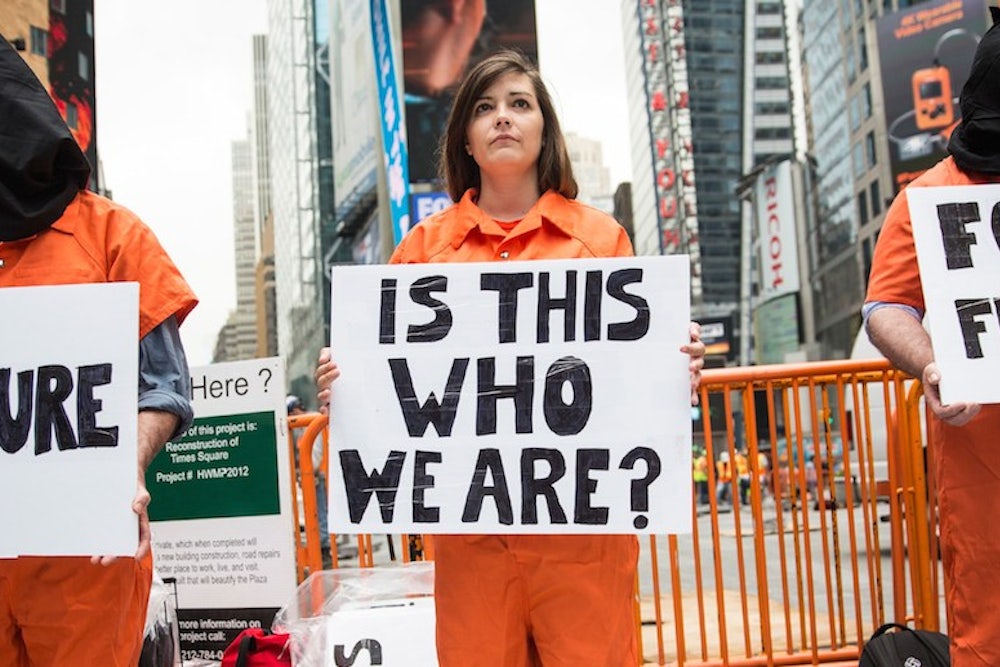GUANTÁNAMO BAY, CUBA — It’s taken over a decade, but the U.S. government is starting to acknowledge the moral and strategic failure of the CIA’s detention and interrogation program. In a press conference earlier this month, President Barack Obama conceded that “we tortured some folks”—a deliberate departure from the government’s well-worn euphemism, “enhanced interrogation.” “We crossed a line,” he said. “And we have to, as a country, take responsibility for that.”
Meanwhile, the five men accused of planning the 9/11 attacks are set to appear in a private, closed-circuit courtroom at Guantánamo Bay this week to hash out pre-trial motions. All of the defendants were tortured under the CIA’s enhanced interrogation program. Khalid Sheikh Mohammed, the ringleader, was waterboarded 183 times in one month in 2003.
Mohammed admitted guilt in 2008 and expressed his wish to be martyred. But during the 13-hour arraignment in May 2012, the defendants refused to respond to questions. The judge interpreted their silence as a de-facto “not guilty” plea. And because the detainees were tortured, much of the evidence that could be used against them is inadmissible. This partially explains why, thirteen years after 9/11, the alleged architects of the most notorious terrorist attack on American soil have yet to be sentenced.
Despite Guantánamo’s history of prisoner abuse, chief prosecutor General Mark Martins insisted that detainees are held in a manner that is compliant with international law.
“This sometimes goes overlooked,” Martins said in a press conference Sunday at Guantánamo. “Many of the people who come here, who I speak to, don’t know that we are recognizing ourselves as needing to comply with the humane treatment standards of Common Article 3 [of the Geneva Conventions].”
Human rights groups have criticized military commissions as lacking the due process protections that are guaranteed in federal courts. But Martins said that the top priority for the commissions is to ensure that “a fair trial and national security are upheld. The American people should be able to have both of those.”
The defense lawyers representing the 9/11 detainees tell a very different story. In the same press conference, defense attorneys Walter Ruiz and James Connell described the military commissions as a system that is more committed to hiding evidence of torture than giving the prisoners a fair trial. For nearly an hour, the two lawyers rattled off examples of the U.S. government’s misconduct in the 9/11 case.
Ruiz represents Mustafa Al Hawsawi, one of the alleged 9/11 planners. Last month, he filed a motion arguing that the conditions of his client’s detention violate international human rights law. Specifically, he referenced solitary confinement, the ban on making phone calls (including to family members), and restrictions on the detainees’ ability to worship as a group. Ruiz has not yet been able to visit his client in Camp 7, the highly secretive facility that houses the high-value detainees. (Details of his client’s detention conditions come from reports by the International Committee of the Red Cross (ICRC). The ICRC has made more than 90 visits to the Guantánamo Bay since 2002, but records from their visits are treated as classified. Last year, the defense team got access to the reports through a court motion.)
Another 9/11 detainee, Ammar al Baluchi, has not been allowed to send letters to people outside of the prison, a privilege afforded to prisoners in high-security prisons in the U.S. “We’re not talking about writings about jihad,” said Connell, who represents him. “I had in my possession a letter from my client to an important mitigation witness saying, ‘This is my lawyer, please talk to him.’”
“That these men, by virtue of having been tortured by the CIA, are no longer allowed to communicate with their families, with people who could help them, or with people who want to discuss the merits of their religion, is just outrageous,” he said.
Correction: A previous version of this article described Walter Ruiz as a Navy commander. He is a former Navy commander.
